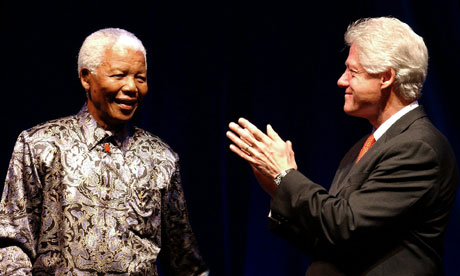
In his last years, increasingly frail though he was, Nelson Mandelabecame one of the world’s most important and effective campaigners against HIV/Aids. It was a difficult issue to take on because it pitched him into opposition with his own government. Believing that public confrontation would be unhelpful, he chose his words carefully; they were no less powerful for that.
By 2000, South Africa was the worst-affected country on the planet, with an HIV prevalence rate among 15- to 49-year-olds of 24.5%: more than 4 million people, and rising fast.
Things had got to this pass on Mandela’s watch. As early as 1992, however, he had given a speech deploring the social conditions that led to the easy spread of Aids, from poverty and overcrowding to the low status of women and a migratory labour system that meant men were away from home for months and frequented sex workers. He talked even then of ending stigma and encouraging condom use.
But while Mandela recognised that Aids was a growing problem, and increased the funding to fight it, he had many pressing concerns during his presidency. There are indications that, with hindsight, he regretted not having done more while in power. During the 1994 election, he told the BBC: “I wanted to win, and I didn’t talk about Aids.” Once he was president, he said, he “had not time to concentrate on the issue”.
Thabo Mbeki took over as president in 1999, as civil society groups, and the Treatment Action Campaign in particular, were becoming vociferous. Their demand for drug treatment for people with HIV coincided with Mbeki’s growing interest in dissident theories about Aids. A few scientists, branded mavericks by the rest, argued there was no proof Aids was caused by a virus. They said it was a disease of poverty and that the antiretroviral drugs by then keeping people alive in rich countries were toxic.
Mandela’s most significant contribution to the fight against Aids may have been his intervention at the international Aids conference in Durban in July 2000. The meeting had become a rally of those who wanted life-saving treatment for Africans with HIV. The powerful speeches of Edwin Cameron, a judge with HIV, and a small boy called Nkosi Johnson, who died a couple of years later, brought it to the world’s attention. Mandela closed the meeting with a speech that changed the Aids agenda.
The conference was, he said, “the one event where every word uttered, every gesture made, has to be measured against the effect it can and will have on the lives of millions of real human beings all over this continent and planet”.
A dispute had been raging on the edge of the conference, he said, that was distracting attention “from the real life-and-death issues we are confronted with as a country, a region, a continent and a world”. That dispute must be put on the back burner, he said. Nobody was totally in the right or in the wrong.
He praised the integrity of Mbeki and the establishment scientists before issuing a passionate and powerful demand that the world should get on with using the tools that had been shown to save lives: information, life skills, abstinence, safe sex and condoms. He also called for action to prevent mother to child transmission, which involved the use of the controversial drugs.
It was a watershed moment that rallied world opinion to the side of action and muted the opposition of the South African government to treatment. Mbeki would no longer discuss his doubts and, although progress was painfully slow, a treatment plan was agreed in principle and there began to be some access to drugs within the public sector.
The speech marked the beginning of Mandela’s total commitment to the battle against HIV/Aids. He continued to avoid confrontation with the government but used his influence in subtle ways. In 2002 he paid a very public visit to the Aids activist Zackie Achmat, who had refused to take antiretroviral drugs until the government made them generally available in South Africa.
As Mandela grew older and more fragile, he gave up all engagements except those at which he was invited to speak on Aids. It became the most important work of his foundation and he launched a charity, to which he gave his Robben Island prison number, 46664, to raise awareness and funds through huge international concerts. Some of the world’s most famous artists and bands performed free, from Queen – whose lead singer, Freddie Mercury, died of Aids – to Beyoncé, the Corrs and the Eurythmics. Bono and Bill Clinton became two of his best allies in the cause. Mandela and Clinton were co-chairs of the advisory board of the International Aids Trust.
In January 2005, the cause became personal. Mandela’s last surviving son, Makgatho, died in a Johannesburg hospital at 54. Within hours, Mandela had publicly announced that his son’s death was from Aids-related complications. Although it later emerged that Makgatho had had pancreatic cancer, he was also HIV positive and on antiretroviral drugs, which would have made him more vulnerable to the disease.
Mandela had been unaware of his son’s HIV status until the previous June, six months before his death. Telling the world that Makgatho had died of Aids was a deliberate and brave defiance of the stigma that still surrounded the illness, and the message to his people that he intended to give was reinforced by the Mbeki’s presence at the funeral.
Few doubt the huge contribution Mandela made to the fight against Aids. After he stood down from the presidency, Mark Heywood, of the Treatment Action Campaign in South Africa, said: “I think Nelson Mandela has been one of the most important voices on Aids in South Africa and in the world. He has used his reputation and his energy to stress how fundamental this is to the future of our country and the developing world generally.”


